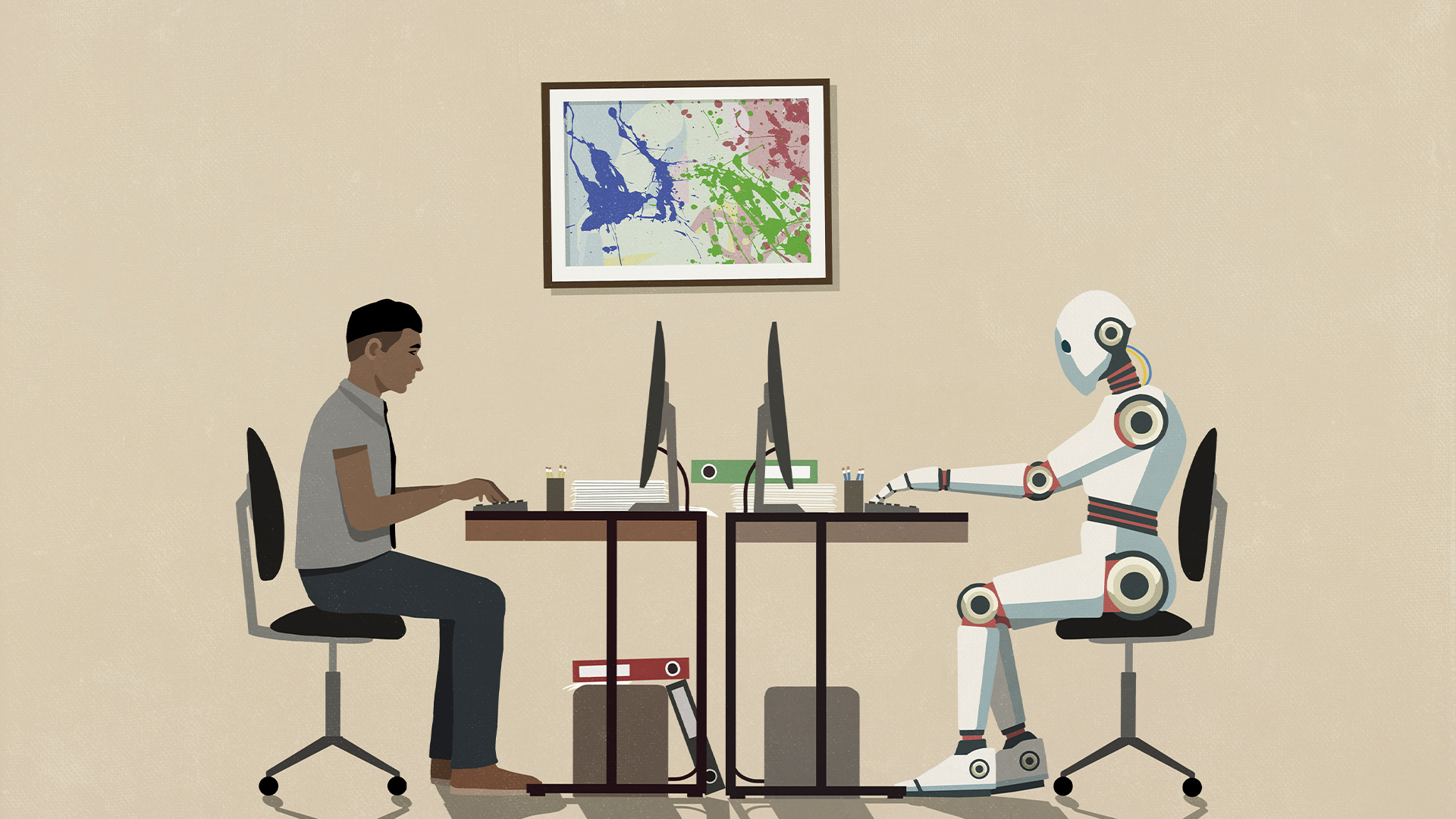AI tools are a game changer for enterprise productivity, but reliability issues are causing major headaches – ‘everyone’s using AI, but very few know how to keep it from falling over’
Enterprises are flocking to AI tools, but very few lack the appropriate infrastructure to drive adoption at scale


Sign up today and you will receive a free copy of our Future Focus 2025 report - the leading guidance on AI, cybersecurity and other IT challenges as per 700+ senior executives
You are now subscribed
Your newsletter sign-up was successful
While AI tools are proving vital for worker productivity, many enterprises are reporting serious problems with reliability - and it’s because they’ve been woefully underprepared for integrating the technology.
A new survey of backend engineers and IT decision makers by Temporal Technologies found that 94% are using AI in their workflows - mostly through tools like Copilot or ChatGPT.
However, just 39% are building reliable internal frameworks to support the adoption of the technology. A key stumbling block is the underlying infrastructure required to scale the technology at an enterprise-wide level, the study noted.
"Most teams think they’re modern. Most teams also admit they’re stuck," one respondent said. "Somewhere between post-build ('we built it!') and pre-scale ('oh god, how do we scale this thing?'), the real challenge begins."
Nearly half of large companies rely on custom-built workflow solutions, compared with just a third of smaller organizations, the survey found.
Three-quarters of teams said their workflows are hampered by issues such as insufficient support for long-running processes and high operational overhead, both cited by 35%, along with failure recovery challenges, a problem for 34%.
Reliability is more important than cost, performance, and speed, with 36% of engineering and IT leaders saying that reliability and compliance are their top development priorities over the next 12-to-24 months.
Sign up today and you will receive a free copy of our Future Focus 2025 report - the leading guidance on AI, cybersecurity and other IT challenges as per 700+ senior executives
Notably, reliability and compliance are now bigger priorities than automation, cited by 33% of respondents, and reducing technical debt (30%).
Developers are getting stuck with AI tools
According to the survey, nearly a third of developers said that complex, long-running workflows break constantly, which hampers efficiency and slows down development processes.
"Everyone’s ‘using AI,’ but very few know how to keep it from falling over,” one respondent said.
“That knowledge gap isn’t just inconvenient, it’s a dealbreaker when you’re trying to scale agentic systems without a way to retry, resume, or even observe what went wrong.”
Tooling priorities and decision-making power are also misaligned, the survey found. In smaller companies, half said that developers typically lead tooling decisions, while in enterprises, that responsibility shifts to IT managers and CIOs at 53%.
For developers at larger enterprises, this means new tools and solutions are essentially dropped in their lap, and responsibility for implementation is left to them.
"The report tells us a lot of what we hear from partners every day—backend challenges aren’t just technical, they’re also organizational,” said Samar Abbas, co-founder and CEO of Temporal Technologies.
“Engineers and decision makers are prioritizing different things, and that disconnect is driving tooling delays, reliability risks, and rising complexity across the stack. AI is only adding another layer of scale and unpredictability.”
Security concerns are rising
Decision makers ranked security as their top concern, with nearly half saying they were losing sleep over customer churn, their biggest concern during outages.
Another 47% said that downtime drives up operational costs, while only 5% said that failures would have no major impact.
Four-in-ten respondents reported that AI’s biggest impact was in code generation - a growing trend in recent months.
A survey from Clutch revealed that 53% of senior software developers believe LLMs can already code better than most humans. However, many voiced serious concerns about data privacy and security risks.
The findings of the Clutch survey align with a previous study on the topic from Cloudsmith, which warned developers are placing too much faith in AI code generation and opening themselves up to potential security risks.
Make sure to follow ITPro on Google News to keep tabs on all our latest news, analysis, and reviews.
MORE FROM ITPRO
- AI coding tools are finally delivering results for enterprises
- Big tech promised developers productivity gains with AI tools – now they’re being rendered obsolete
- AI coding tools aren’t the solution to the unfolding 'developer crisis’
Emma Woollacott is a freelance journalist writing for publications including the BBC, Private Eye, Forbes, Raconteur and specialist technology titles.
-
 Pulsant unveils high-density data center in Milton Keynes
Pulsant unveils high-density data center in Milton KeynesNews The company is touting ultra-low latency, international connectivity, and UK sovereign compute power to tempt customers out of London
-
 Anthropic Labs chief claims 'Claude is now writing Claude'
Anthropic Labs chief claims 'Claude is now writing Claude'News Internal teams at Anthropic are supercharging production and shoring up code security with Claude, claims executive
-
 Business leaders are using AI as a “license to reduce headcount” – new Morgan Stanley research lays bare the impact on UK workers
Business leaders are using AI as a “license to reduce headcount” – new Morgan Stanley research lays bare the impact on UK workersNews Analysis of five sectors highlights an "early warning sign" of AI’s impact on jobs
-
 Lloyds Banking Group wants to train every employee in AI by the end of this year – here's how it plans to do it
Lloyds Banking Group wants to train every employee in AI by the end of this year – here's how it plans to do itNews The new AI Academy from Lloyds Banking Group looks to upskill staff, drive AI use, and improve customer service
-
 CEOs are fed up with poor returns on investment from AI: Enterprises are struggling to even 'move beyond pilots' and 56% say the technology has delivered zero cost or revenue improvements
CEOs are fed up with poor returns on investment from AI: Enterprises are struggling to even 'move beyond pilots' and 56% say the technology has delivered zero cost or revenue improvementsNews Most CEOs say they're struggling to turn AI investment into tangible returns and failing to move beyond exploratory projects
-
 Companies continue to splash out on AI, despite disillusionment with the technology
Companies continue to splash out on AI, despite disillusionment with the technologyNews Worldwide spending on AI will hit $2.5 trillion in 2026, according to Gartner, despite IT leaders wallowing in the "Trough of Disillusionment" – and spending will surge again next year.
-
 Finance and security leaders are odds over cyber priorities, and it’s harming enterprises
Finance and security leaders are odds over cyber priorities, and it’s harming enterprisesNews Poor relations between the departments can be solved by CISOs talking in a language CFOs understand
-
 A new study claims AI will destroy 10.4 million roles in the US by 2030, more than the number of jobs lost in the Great Recession – but analysts still insist there won’t be a ‘jobs apocalypse’
A new study claims AI will destroy 10.4 million roles in the US by 2030, more than the number of jobs lost in the Great Recession – but analysts still insist there won’t be a ‘jobs apocalypse’News A frantic push to automate roles with AI could come back to haunt many enterprises, according to Forrester
-
 Businesses aren't laying off staff because of AI, they're using it as an excuse to distract from 'weak demand or excessive hiring'
Businesses aren't laying off staff because of AI, they're using it as an excuse to distract from 'weak demand or excessive hiring'News It's sexier to say AI caused redundancies than it is to admit the economy is bad or overhiring has happened
-
 Lisa Su says AI is changing AMD’s hiring strategy – but not for the reason you might think
Lisa Su says AI is changing AMD’s hiring strategy – but not for the reason you might thinkNews AMD CEO Lisa Su has revealed AI is directly influencing recruitment practices at the chip maker but, unlike some tech firms, it’s led to increased headcount.
